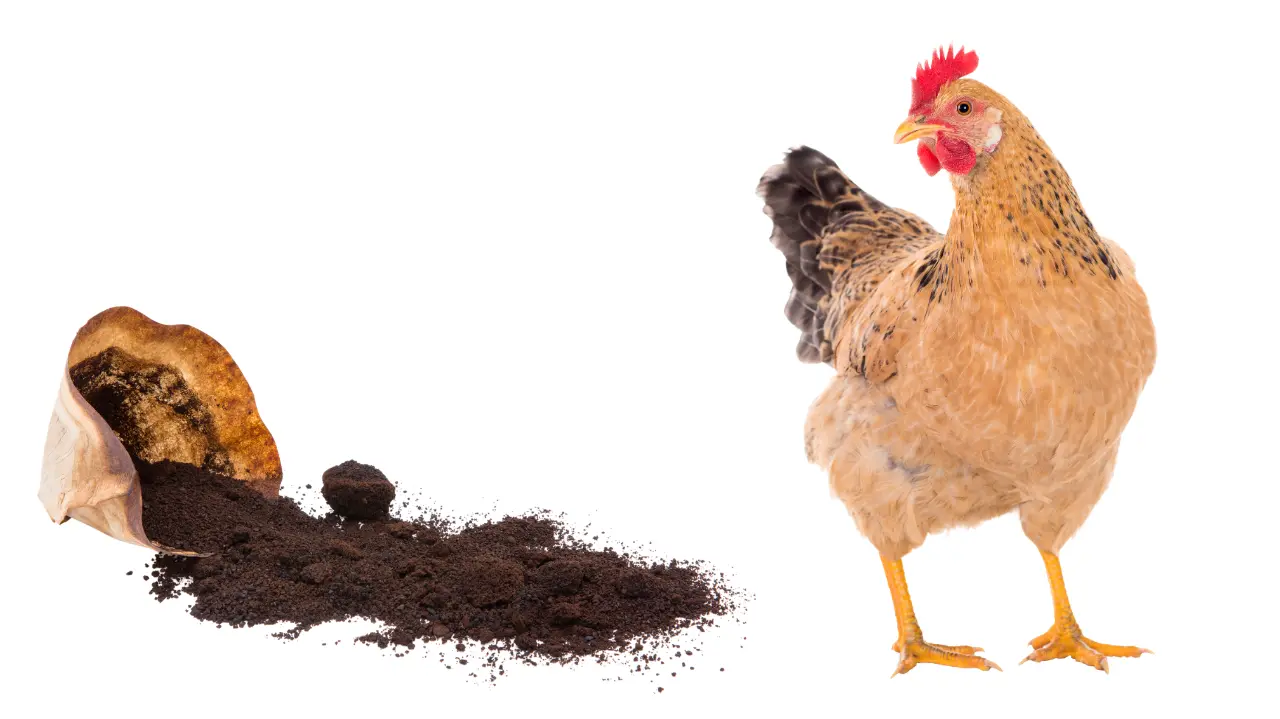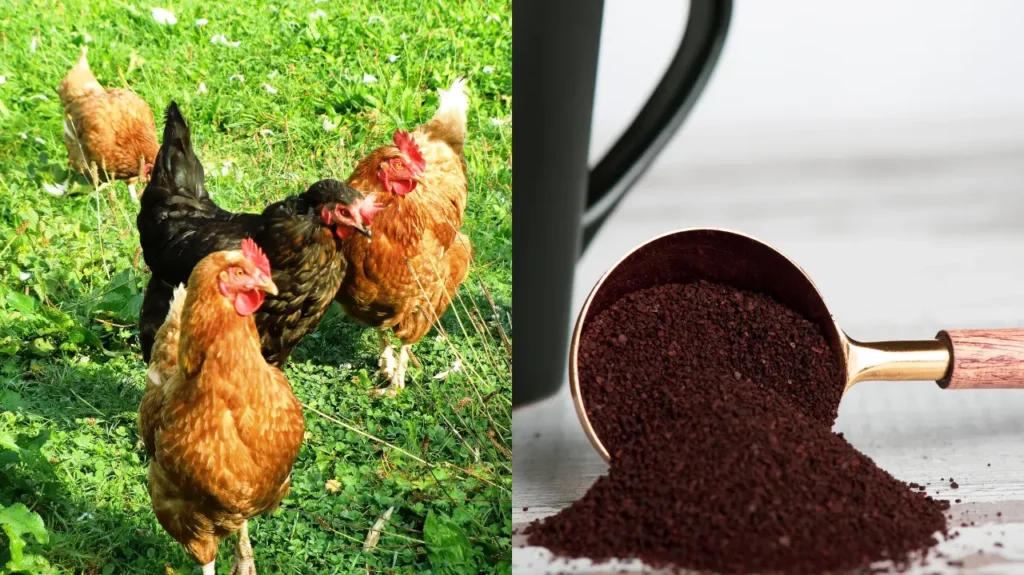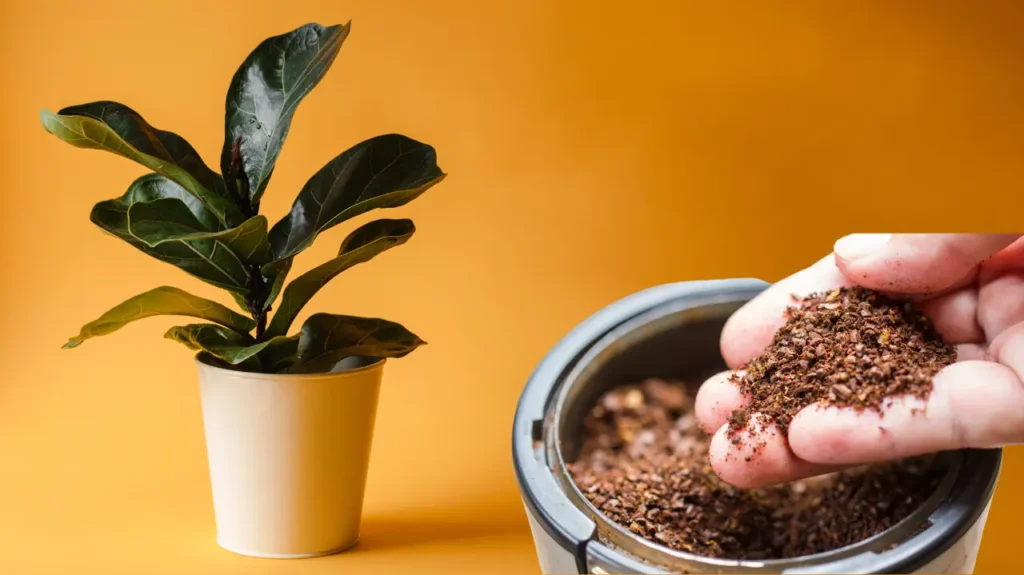You’ve just finished your morning coffee, staring at the damp grounds left in the filter.
Your backyard chickens scratch happily nearby, and a thought hits: Could these leftovers be a snack for them?
It’s a tempting idea: reduce waste and treat your flock.
But before you toss those grounds into the coop, pause. “can chickens eat coffee grounds?” isn’t just quirky; it’s critical for keeping your birds safe.
Coffee fuels our days, but its leftovers hide risks many owners overlook.
Let’s uncover the truth behind this common kitchen scrap and why what’s harmless to us could harm your feathered friends. Science and farmer wisdom agree: the answer might surprise you.
Can Chickens Eat Coffee Grounds?
No, chickens and coffee grounds are a dangerous mix. Science shouts a warning: those leftover grounds you’d toss into the compost?
They’re packed with caffeine and methylxanthine, two compounds chickens’ bodies can’t handle. Let’s explain why even a tiny amount risks your flock’s health.
Back in 1944, researchers tested coffee grounds on chicks. They split 100 Rhode Island Red chicks into groups, feeding some diets with up to 25% coffee grounds.
The result?
Chicks eating grounds grew slower, weaker, and struggled to thrive. Oat hulls, a safer fibre source, didn’t cause these issues. Coffee wasn’t just useless; it actively harmed them.
Decades later, a 2022 study dug deeper. Scientists gave 288 broiler chicks caffeine daily, tracking doses from 0 to 100mg per kilogram of body weight.
Small amounts (under 50mg) seemed harmless, even boosting growth slightly.
But cross that threshold, disaster struck: hearts raced, stress hormones spiked, and genes linked to serotonin (a mood regulator) went haywire.
For a 5-pound hen, 50mg equals roughly 0.1 grams of caffeine, less than a single coffee ground.
Laying hens face even graver risks. A 2020 trial added caffeine to their feed at 300-450 parts per million. Hens guzzling higher doses died sooner.
Survivors laid eggs with thinner shells and watery yolks, and egg quality crashed. Imagine your hens panting, restless, or collapsing after pecking at the ground. It’s not fearmongering; it’s biology.
Caffeine doesn’t just “stimulate” chickens. It hijacks their nervous systems, strains their hearts, and weakens their eggs.
Farmers might shrug, “My hens nibbled grounds and survived,” but why gamble? Research proves the danger isn’t theoretical.
Why Coffee Grounds Are Harmful to Chickens
Think of caffeine as a poison pill disguised as a treat. Chickens lack the enzymes to break it down. When they peck at coffee grounds, caffeine floods their tiny bodies.
Within minutes, their hearts race like overclocked engines. Blood pressure spikes. Kidneys strain to filter toxins they weren’t built to process. Seizures, tremors, and collapse follow.
It’s not just the caffeine. Coffee grounds also pack methylxanthine, a compound that’s deadly to pets and livestock. You know chocolate kills dogs?
The same rules apply here. Methylxanthine disrupts cell communication, confusing muscles and nerves.
Imagine your hen’s legs twitching uncontrollably or her breath turning shallow. These aren’t rare reactions; they’re predictable outcomes.
Symptoms hit fast. Thirty minutes post-snack, a chicken might seem restless, pacing the coop. An hour later, she’s gasping, wings drooping.
Without quick intervention, death follows. And here’s the kicker: there’s no antidote. Vets can only offer supportive care, hoping their bodies flush toxins quickly.
Small doses aren’t safer. Chickens weigh 5-10 pounds, a fraction of humans. What’s a speck of coffee to us is a tidal wave of stimulants for them.
Nutritional Content of Coffee Grounds
Coffee grounds work magic in compost piles. They’re loaded with nitrogen, calcium, and potassium, nutrients that help tomatoes thrive and roses bloom.
Toss them into soil; they fight germs, boost antioxidants, and feed earthworms. For gardens, they’re a superhero.
But chickens aren’t plants. Their tiny digestive systems can’t extract the good from coffee grounds without swallowing the bad.
Magnesium and fibre sound healthy, but chickens need these from safe sources like leafy greens or grains. Coffee’s “benefits” come shackled to caffeine and methylxanthine, turning a potential snack into a toxic trap.
Here’s the twist: chickens don’t process nutrients like soil does. What enriches your compost bin wrecks their gut balance.
Imagine pouring fertilizer directly into a chicken’s crop; it’s harsh, abrasive, and loaded with chemicals that their bodies reject.
The result? Diarrhea, dehydration, and malnourishment. Even if caffeine weren’t deadly, coffee grounds fail as chicken feed.
Decaffeinated Coffee Grounds
Decaffeinated coffee grounds aren’t the loophole you’d hope for. Yes, most caffeine gets stripped away, but traces linger.
A bean labelled “decaf” still holds 2-3% of its original caffeine. For a chicken, that’s like sipping poison slowly instead of chugging it.
Worse? The decaffeination process itself is a chemical minefield. Beans are often soaked in solvents like methylene chloride (a paint stripper ingredient) or ethyl acetate (found in nail polish remover).
These residues cling to grounds, even after brewing. Imagine your hen pecking at something that smells like a hardware store cleaner. Not exactly appetizing or safe.
Some argue, “But the amounts are tiny!” True, but chickens are tiny, too. Their organs can’t detoxify industrial chemicals.
A study might claim decaf is “safer in small amounts,” but why risk it? There’s zero nutritional payoff, only potential harm.
Safe Uses for Coffee Grounds Around Chickens
Coffee grounds don’t belong in your chickens’ diet, but they’re not useless on your farm. With a bit of creativity, you can repurpose them safely. Here’s how:
Compost, But Lock It Down
Toss those grounds into your compost pile! They’re rich in nitrogen, speeding up decomposition and creating nutrient-dense soil.
But here’s the catch: chickens love scratching through compost. One curious peck could mean a caffeine hit. Fence off your compost bin or use a lidded tumbler.
Mix grounds with straw, leaves, or veggie scraps to dilute their scent and appeal. Let the pile “cook” for months; fully broken-down compost is safer if chickens eventually roam near it.
Bedding? Proceed With Caution
Some farmers swear by coffee grounds as coop bedding, claiming it masks odours. But, and this is a big but, chickens explore the world with their beaks.
A few accidental bites add up even if they’re not eating bedding. If you test this, blend grounds with pine shavings or straw to reduce concentration.
Watch your flock like a hawk. Droopy wings or odd behaviour? Scoop out the grounds immediately. Most veterans skip the gamble and stick to safer, tasteless bedding like hemp or sand.
Garden Guardian, Not Chicken Snack
Sprinkle coffee grounds around garden plants to deter slugs and ants. The gritty texture repels pests, and the smell masks tender seedlings.
Just keep this area strictly off-limits to chickens. Use raised beds or fencing. Remember: gardens thrive on coffee; chickens don’t.
Alternatives to Feeding Coffee Grounds
Skip the coffee waste and treat your flock to snacks they’ll love without the hidden dangers. Chickens go crazy for chopped apples (seeds removed), mashed bananas, or watermelon rinds.
These fruits pack vitamins A and C, boosting immunity and feather health. Try shredded carrots, cucumber slices, or leafy greens like kale and spinach for veggies.
These add calcium for strong eggshells and keep beaks busy.
Herb scraps? Yes! Basil, mint, or parsley tossed into the run freshens breath and acts as a natural dewormer—protein-packed options like mealworms or scrambled eggs (cooked, no seasoning) fuel feather growth and energy.
Even plain yogurt aids digestion; avoid sugary flavours.
Rule of thumb: keep treats fresh and pesticide-free. Wash produce thoroughly, chop pieces beak-sized, and avoid anything mouldy or salty.
A bored chicken might peck at coffee grounds, but a well-fed flock craises crunchy veggies, not caffeine.
Controversy and Mixed Opinions
Some backyard chicken forums and blogs whisper, “A little coffee won’t hurt.” One popular site, The Organic Goat Lady, claims hens can handle small amounts of ground.
But here’s the problem: chickens aren’t machines. Their tolerance varies wildly. One hen might nibble a speck and seem fine; another collapses after two pecks.
Science doesn’t support the “moderation” myth. Studies prove caffeine harms chickens over time, whether through stunted growth, weak eggs, or organ stress.
Imagine arguing, “A little rat poison is okay.” That’s the logic here. Chickens lack a universal “safe dose” for toxins.
Why the confusion? Anecdotes. Someone’s flock once ate grounds and survived. But survival isn’t health.
Hidden damage, like kidney strain or hormonal shifts, doesn’t show symptoms until too late. Plus, chickens are opportunistic eaters.
Let them taste coffee once, and they’ll seek it again, compounding risks.
Practical Tips for Chicken Owners
Chickens are sneaky. They’ll peck at anything shiny, crunchy, or suspiciously fragrant, including coffee grounds.
If you’re determined to use grounds in your garden or compost, here’s how to stay three steps ahead of your flock:
Fence First, Fertilize Later
Sprinkle coffee grounds around roses or tomatoes. Fine, but only in zones chickens can’t reach. Install a low fence (18 inches tall) around garden beds.
Use hardware cloth, not chicken wire; those crafty birds will stick their necks through gaps. For raised beds, add a removable mesh cover. Out of sight, out of beak.
Compost Like a Ninja
Chickens adore scratching through compost for bugs. To keep them safe, bury coffee grounds deep in the pile.
Layer them between straw, grass clippings, or shredded paper. Better yet, use a locked compost tumbler.
If your heap is open-air, fence it like Fort Knox and let the pile age at least 6 months before allowing chickens near it. Fully decomposed compost hides the coffee scent.
The 10-Minute Watch Rule
Introduced coffee grounds to your garden? Stick around. Observe your flock for 10 minutes. Are they pacing the new area, tilting their heads, or scratching aggressively?
Redirect them with a handful of mealworms or a cabbage hung from a string. Distraction is your best defence.
When in Doubt, Toss Em Out
Love your morning brew but hate the hassle? Dump used grounds in a sealed trash can, far from the coop. Chickens can’t resist knocking over bins.
Use a can with a tight lid, or store it in the garage.
Conclusion
Let’s bury this myth for good. Chickens and coffee grounds? A recipe for disaster. Decades of research, from 1944’s stunted chicks to 2022’s heart-stressed broilers, agree that caffeine and methylxanthine are silent killers.
These compounds don’t just “bother” chickens; they rewrite their biology, sabotaging growth, eggs, and longevity.
Yes, coffee grounds nourish gardens. But your flock isn’t a compost pile. What greens your tomatoes risks collapsing your hens.
Even “safe” uses like bedding demand hawk-eyed supervision. Why flirt with danger when alternatives abound?
Stick to treats that cluck, not kill. Fresh veggies, juicy fruits, and protein-packed bugs keep hens thriving without the gamble.
Coffee? Save it for your mug. Your chickens’ health isn’t a DIY experiment; it’s a responsibility.




